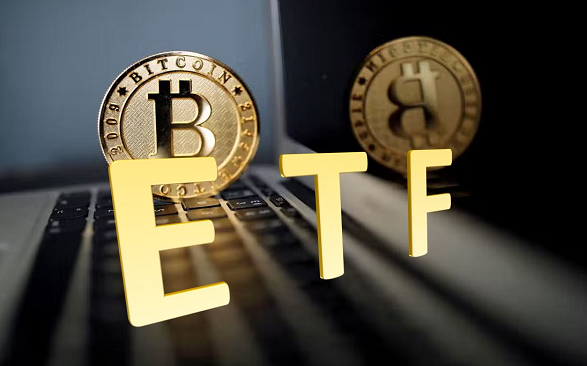The U.S Securities and Exchange Commission (U.S SEC) has cautioned that the filings for Bitcoin Spot Exchange-Traded Funds (ETFs) made by financial giants like Fidelity and BlackRock may lack comprehensive details, casting doubt on the approval of these applications.
SEC raises concerns over Bitcoin Spot ETF filings
The U.S SEC has expressed reservations regarding the recent filings for Bitcoin Spot ETFs made by major financial institutions, including BlackRock and Fidelity. The U.S SEC, known for its stringent regulations and history of rejecting similar products, has cited inadequate information as a potential stumbling block for these applications. The agency’s continued scrutiny of the cryptocurrency industry has added uncertainty to the fate of Bitcoin ETFs in the United States. This is according to a report on Friday by the Wall Street Journal.
BlackRock and Fidelity’s Attempt at Bitcoin Spot ETFs.
BlackRock, one of the world’s largest asset management firms, recently made headlines by applying to launch a Bitcoin Spot ETF in the United States. If approved, this would mark the first Bitcoin ETF in the country. Fidelity, another prominent player in the financial industry, followed suit and refiled its application shortly after. Both companies sought to provide investors with a regulated and accessible means to gain exposure to Bitcoin through ETFs.
However, according to a Wall Street Journal report citing insider sources, the SEC has raised concerns about the clarity and comprehensiveness of the applications submitted by BlackRock and Fidelity. The agency reportedly informed Nasdaq and CBOE, the exchanges supporting the filings, that the applications lacked sufficient detail. This critique echoes past rejections of Bitcoin Spot ETFs by the SEC, contributing to the prevailing uncertainty surrounding their approval.
Read also: Bitcoin Cash soars 107.22% in one week following EDX Markets’ launch.
Global Crypto Regulation
In other parts of the world, some jurisdictions are taking positive approaches to crypto regulation. Spain recently made a significant move by granting Crypto.com registration as a Virtual Asset Service Provider (VASP). This designation allows Crypto.com, a significant cryptocurrency exchange and platform, to operate within the Spanish market under regulatory supervision. The move highlights the importance of providing a clear regulatory framework for virtual assets and its commitment to fostering innovation while ensuring consumer protection in Spain.
The United Arab Emirates (UAE) and Hong Kong have also joined forces to enhance their regulatory frameworks for financial infrastructure and digital assets. The central banks of both jurisdictions have embarked on collaborative efforts to develop comprehensive legislation addressing the evolving challenges and opportunities in the crypto space. This initiative reflects their commitment to facilitating responsible growth in the digital asset sector and fostering a secure and transparent financial ecosystem.
In the United Kingdom, the Financial Services and Markets Act 2023, a reform bill aimed at updating and strengthening financial regulations, has received Royal Assent. The bill, now officially a law, was granted by King Charles on Thursday. The reform is expected to provide enhanced regulatory oversight and consumer protection in the UK’s financial markets.
With recent enforcement actions in the United States, Binance, one of the world’s largest cryptocurrency exchanges, appears to be redirecting its attention toward the United Arab Emirates (UAE). It may be that the company sees the UAE as a significant focus for its future operations, potentially capitalizing on the country’s favorable regulatory environment and growing interest in cryptocurrencies. Binance’s strategic move reflects the importance of adapting to evolving regulatory landscapes and exploring new markets to ensure sustainable growth in the crypto industry.
Read also: Why exactly the U.S SEC sued Binance, the biggest crypto exchange in the world, and Zhao
The crypto industry continues to evolve, and market participants must stay abreast of regulatory developments to foster a sustainable and secure environment for cryptocurrencies and digital assets. Meanwhile, amidst the regulatory uncertainty in the US, various jurisdictions are enhancing their regulatory frameworks for cryptocurrencies.
Bitcoin Price Dips Below $30K Amidst Regulatory Concerns
Bitcoin’s price dropped below $30,000 following the SEC’s warning about inadequate filings for Bitcoin Spot ETFs.
At the time of writing, the price of Bitcoin (BTC) stands at $30,079.89. This marks a decrease from its initial price of $31,280 today. Over the past 24 hours, Bitcoin has seen a -1.30% decline, and over the past seven days, a -0.60% decline in price. The 24-hour trading volume for BTC currently stands at $22,166,929,290.51. With a circulating supply of 19 million BTC, Bitcoin holds a market cap of $583,217,207,101.
Read more: Binance accuses the U.S SEC of aiming to unilaterally define crypto market structure.
Credit: Solomon Victor is a Technical Analyst who is also knowledgeable about various aspects of blockchain and cryptocurrency.
Discover more from Crypto Asset Buyer
Subscribe to get the latest posts sent to your email.





